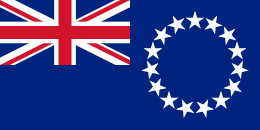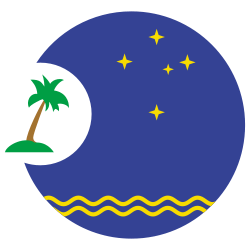Politics of the Cook Islands
 |
| This article is part of a series on the politics and government of the Cook Islands |
The politics of the Cook Islands, an associated state, takes place in a framework of a parliamentary representative democracy within a constitutional monarchy. The Queen of New Zealand, represented in the Cook Islands by the Queen's Representative, is the Head of State; the Chief Minister is the head of government and of a multi-party system. The Islands are self-governing in free association with New Zealand and are fully responsible for internal affairs. New Zealand retains some responsibility for external affairs, in consultation with the Cook Islands. In recent years, the Cook Islands have taken on more of its own external affairs; as of 2005, it has diplomatic relations in its own name with eighteen other countries. Executive power is exercised by the government, while legislative power is vested in both the government and the islands' parliament. The judiciary is independent of the executive and the legislatures.
Constitution
The Constitution of the Cook Islands took effect on August 4, 1965, when the Cook Islands became a self-governing territory in free association with New Zealand. The anniversary of these events in 1965 is commemorated annually on Constitution Day, with week long activities known as Te Maeva Nui Celebrations locally.
Executive
| Office | Name | Party | Since |
|---|---|---|---|
| Queen | Elizabeth II | 6 February 1952 | |
| Queen's Representative | Tom Marsters | 27 July 2013 | |
| Prime Minister | Henry Puna | CIP | 30 November 2010 |
The monarch is hereditary; her representative is appointed by the monarch on the recommendation of the Cook Islands Government. The cabinet is chosen by the prime minister and collectively responsible to Parliament.
Ten years of rule by the Cook Islands Party (CIP) came to an end 18 November 1999 with the resignation of Prime Minister Joe Williams. Williams had led a minority government since October 1999 when the New Alliance Party (NAP) left the government coalition and joined the main opposition Democratic Party (DAP). On 18 November 1999, DAP leader Dr. Terepai Maoate was sworn in as prime minister. He was succeeded by his co-partisan Robert Woonton. When Dr Woonton lost his seat in the 2004 elections, Jim Marurai took over. In the 2010 elections, the CIP regained power and Henry Puna was sworn in as prime minister on 30 November 2010.
Following uncertainty about the ability of the government to maintain its majority, the Queen's representative dissolved parliament mid-way through its term and a 'snap' election was held on 26 September 2006. Jim Marurai's Democratic Party retained the Treasury benches with an increased majority.
The New Zealand High Commissioner is appointed by the New Zealand Government.
Legislature
The Parliament of the Cook Islands has 24 members, elected for a five-year term in single-seat constituencies. There is also a House of Ariki, composed of chiefs, which has a purely advisory role. The Koutu Nui is a similar organization consisting of sub-chiefs. It was established by an amendment in 1972 of the 1966 House of Ariki Act. The current President is Te Tika Mataiapo Dorice Reid.
On June 13, 2008, a small majority of members of the House of Ariki attempted a coup, claiming to dissolve the elected government and to take control of the country's leadership. "Basically we are dissolving the leadership, the prime minister and the deputy prime minister and the ministers," chief Makea Vakatini Joseph Ariki explained. The Cook Islands Herald suggested that the ariki were attempting thereby to regain some of their traditional prestige or mana.[1][2] Prime Minister Jim Marurai described the take-over move as "ill-founded and nonsensical".[3] By June 23, the situation appeared to have normalised, with members of the House of Ariki accepting to return to their regular duties.[4]
Political parties and elections
| Parties | Votes | % | Seats | |
|---|---|---|---|---|
| Cook Islands Party | 3,499 | 41.51 | 13 | |
| Democratic Party | 3,811 | 45.21 | 8 | |
| One Cook Islands | 790 | 9.37 | 2 | |
| Titikaveka Oire | 96 | 1.14 | 0 | |
| Independents | 73 | 0.87 | 0 | |
| Total counted | 8,364 | 99.23 | 24 | |
| Invalid/blank votes | 65 | 0.77 | – | |
| Total | 8,429 | 100.00 | 24 | |
| Registered voters/turnout | 10,394 | 81.09 | – | |
| Source: Ministry of Finance and Economic Management | ||||
Recent political history
The 1999 election produced a hung Parliament. Cook Islands Party leader Geoffrey Henry remained Prime Minister, but was replaced after a month by Joe Williams following a coalition realignment. A further realignment three months later saw Williams replaced by Democratic Party leader Terepai Maoate. A third realignment saw Maoate replaced mid-term by his deputy Robert Woonton in 2002, who ruled with the backing of the CIP.
The Democratic Party won a majority in the 2004 election, but Woonton lost his seat, and was replaced by Jim Marurai. In 2005 Marurai left the Democrats due to an internal disputes, founding his own Cook Islands First Party. He continued to govern with the support of the CIP, but in 2005 returned to the Democrats. The loss of several by-elections forced a snap-election in 2006, which produced a solid majority for the Democrats and saw Marurai continue as Prime Minister.
In December 2009, Marurai sacked his Deputy Prime Minister, Terepai Maoate, sparking a mass-resignation of Democratic Party cabinet members[5][6] He and new Deputy Prime Minister Robert Wigmore were subsequently expelled from the Democratic Party.[7] Marurai appointed three junior members of the Democratic party to Cabinet,[8] but on 31 December 2009 the party withdrew its support.[9]
In May 2014 a new party was formed by Teina Bishop of Aitutaki "One Cook Islands" Party.
See also
References
- ↑ "Cooks heading for internal strife". One News. 13 June 2008. Retrieved 3 November 2011.
- ↑ "NZ Maori stirs Cooks sovereignty stoush". Stuff.co.nz. NZPA. 13 June 2008. Retrieved 3 November 2011.
- ↑ "NZ Maori behind strange Cook's 'coup'". Stuff.co.nz. 17 June 2008. Retrieved 3 November 2011.
- ↑ "Cook Islands chiefs drop take over claim, return to normal duties". Radio New Zealand International. 23 June 2008. Retrieved 3 November 2011.
- ↑ "Cooks Deputy Prime Minister replaced, prompting a walkout". Radio New Zealand International. 2009-12-24. Retrieved 2009-12-24.
- ↑ "Cabinet Ministers Resign in Support of Party Leader". Democratic Party - Cook Islands. 2009-12-23. Retrieved 2009-12-25.
- ↑ "PM sacked by Demo Party". Cook Islands Herald. 2009-12-23. Retrieved 2009-12-27.
- ↑ "PM appoints new ministers". Cook Islands News. 2009-12-26. Archived from the original on 5 January 2010. Retrieved 2010-01-01.
- ↑ "Marurai Wilkie coalition falling apart". Democratic Party - Cook Islands. 2009-12-31. Archived from the original on 6 October 2011. Retrieved 2010-01-04.
